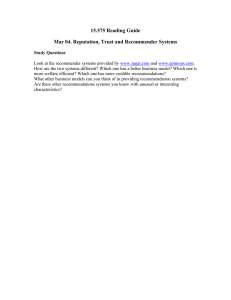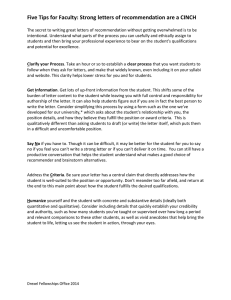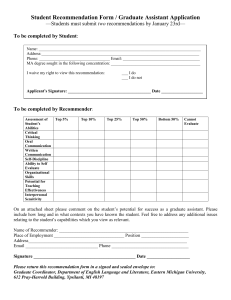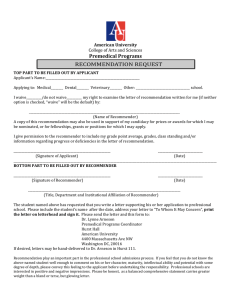www.ijecs.in International Journal Of Engineering And Computer Science ISSN:2319-7242
advertisement
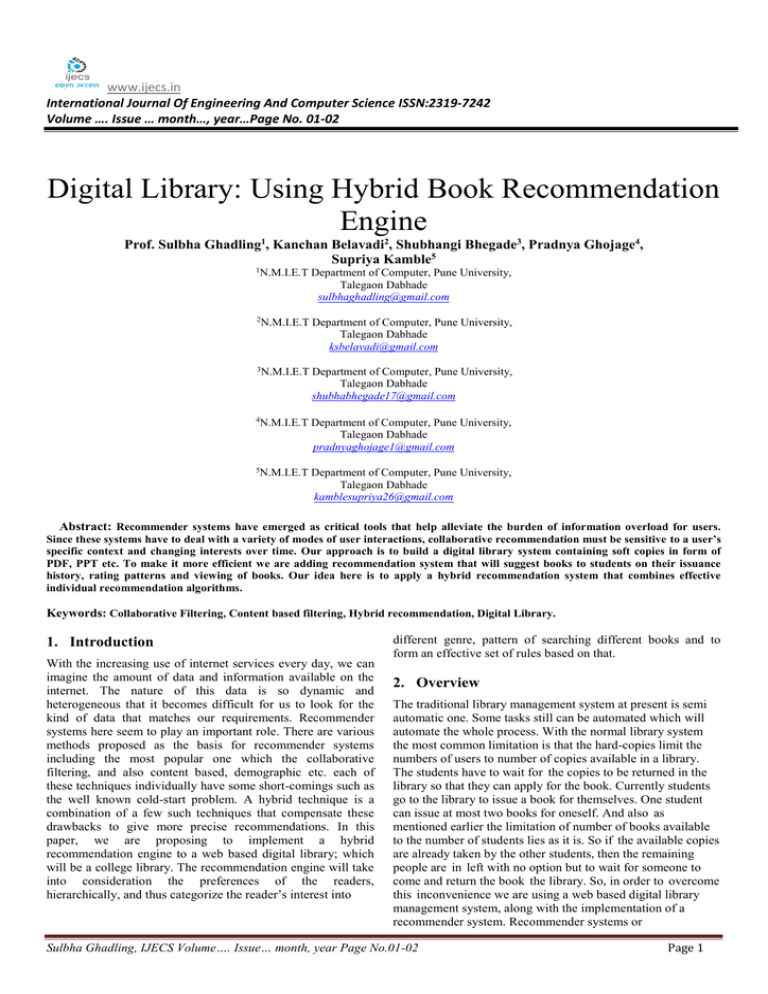
www.ijecs.in International Journal Of Engineering And Computer Science ISSN:2319-7242 Volume …. Issue … month…, year…Page No. 01-02 Digital Library: Using Hybrid Book Recommendation Engine Prof. Sulbha Ghadling1, Kanchan Belavadi2, Shubhangi Bhegade3, Pradnya Ghojage4, Supriya Kamble5 1N.M.I.E.T Department of Computer, Pune University, Talegaon Dabhade sulbhaghadling@gmail.com 2N.M.I.E.T Department of Computer, Pune University, Talegaon Dabhade ksbelavadi@gmail.com 3N.M.I.E.T Department of Computer, Pune University, Talegaon Dabhade shubhabhegade17@gmail.com 4N.M.I.E.T Department of Computer, Pune University, Talegaon Dabhade pradnyaghojage1@gmail.com 5N.M.I.E.T Department of Computer, Pune University, Talegaon Dabhade kamblesupriya26@gmail.com Abstract: Recommender systems have emerged as critical tools that help alleviate the burden of information overload for users. Since these systems have to deal with a variety of modes of user interactions, collaborative recommendation must be sensitive to a user’s specific context and changing interests over time. Our approach is to build a digital library system containing soft copies in form of PDF, PPT etc. To make it more efficient we are adding recommendation system that will suggest books to students on their issuance history, rating patterns and viewing of books. Our idea here is to apply a hybrid recommendation system that combines effective individual recommendation algorithms. Keywords: Collaborative Filtering, Content based filtering, Hybrid recommendation, Digital Library. 1. Introduction With the increasing use of internet services every day, we can imagine the amount of data and information available on the internet. The nature of this data is so dynamic and heterogeneous that it becomes difficult for us to look for the kind of data that matches our requirements. Recommender systems here seem to play an important role. There are various methods proposed as the basis for recommender systems including the most popular one which the collaborative filtering, and also content based, demographic etc. each of these techniques individually have some short-comings such as the well known cold-start problem. A hybrid technique is a combination of a few such techniques that compensate these drawbacks to give more precise recommendations. In this paper, we are proposing to implement a hybrid recommendation engine to a web based digital library; which will be a college library. The recommendation engine will take into consideration the preferences of the readers, hierarchically, and thus categorize the reader’s interest into different genre, pattern of searching different books and to form an effective set of rules based on that. 2. Overview The traditional library management system at present is semi automatic one. Some tasks still can be automated which will automate the whole process. With the normal library system the most common limitation is that the hard-copies limit the numbers of users to number of copies available in a library. The students have to wait for the copies to be returned in the library so that they can apply for the book. Currently students go to the library to issue a book for themselves. One student can issue at most two books for oneself. And also as mentioned earlier the limitation of number of books available to the number of students lies as it is. So if the available copies are already taken by the other students, then the remaining people are in left with no option but to wait for someone to come and return the book the library. So, in order to overcome this inconvenience we are using a web based digital library management system, along with the implementation of a recommender system. Recommender systems or Sulbha Ghadling, IJECS Volume…. Issue… month, year Page No.01-02 Page 1 recommendations are subclass of information filtering system that seek to predict the 'rating' or 'preference' that user would give to an item. The application will have all the functionalities of a normal library management system. 3. 3. Techniques Used The key feature of the proposed web library management system is the application of a recommendation model. The Recommender systems provide a personalized way of guiding users in to interesting or useful objects in a large space of possible options. Recommendation algorithms use input as user’s information or interests and also the database of the items and the output is generated as list of recommended items. There various diverse algorithms and techniques proposed that help creating personalized recommendations. Recommendation techniques can be distinguished on the basis of their knowledge sources. Among them the most common ones are: won’t be allowed. Rating of books is allowed for the users. Recommender for books: The application will have a recommendation model that will suggest books based on user’s history, what books he applied for and what books were issued. Figure 1: System Architecture 3.1 Collaborative Filtering: This system generates recommendations using information about rating profiles of different users. Collaborative systems locate peer users with a rating history similar to the current user and generate recommendations using this neighborhood. 3.2 Content-based Filtering: This system generates recommendations using two sources: the features associated with products and the ratings that a user has given them. Content-based recommenders treat recommendation as a user-specific classification problem and based on the product features, it learns a classifier for user's likes and dislikes. 3.3 Demographic Filtering: This system generates recommendations based on a demographic profile of the user. Recommended products can be produced for different demographic niches, by combining the ratings of users in those niches. These conventional approaches suffer some limitations like quality, accuracy, precision of the recommendation criteria. We also have to face a cold start problem for new items or new users. Converse to this is a stability vs. plasticity problem. Once a user’s profile has been established in the system, it is difficult to change one’s preferences. To overcome such problems with the existing book recommender systems, hybrid recommendation algorithm has been proposed. We will combine these three techniques together to overcome the drawbacks set by one recommendation technique and sum up advantages of different recommendation techniques. The user would be able to perform the activities like rating a book, viewing a book, applying for a book or search for a book. Being a web based system the user would be privileged to visit the library from anywhere and at any hour of the day. It will be a well automated application for the convenience of the users. The data filtering and generating suggestions will be done by the hybrid recommender model limiting the efforts of the user to search for his preferences. The combination of various approaches of the recommender techniques can proceed in different ways: 1. Separately implementing algorithms and join the results. 2. Utilizing some rules of content-based filtering in collaborative approach. 3. Utilizing some rules of collaborative filtering in content-based approach. 4. Create a unified recommender system, that brings together both approaches. 5. Result and Discussions This project would provide an easy to use graphical user interface for user profiles and book information management. Generate optimal recommendations for people that have not sufficient personal experience to evaluate the number of alternatives offered by a website. 4. Proposed System This paper proposes to develop a web based application which can be installed on the system and performs following operations : 1. 2. Library Management: The application will all functionalities of a library management system. View E-Book: The application will have mechanism for viewing e-books and read them. Downloading 6. Future Scope This application can be used for college libraries and also for for public libraries and private online libraries. The recommendation module of this application can be diversified for book e-commerce websites on books. 7. Conclusion Sulbha Ghadling, IJECS Volume…. Issue… month, year Page No.01-02 Page 2 The main feature of our project is a hybrid recommerder system. It is a college library project. We are presenting a complete digital library management approach along with generation of recommendation that shows better quality, accuracy and precision in the suggestions that it generates. 8. Acknowledgement We take this opportunity to express our sincere gratitude towards our team members and all the people who supported us during our project work. We would like to express our gratitude to our guide, Prof. Sulbha Ghadling for providing us valuable guidance. We would like to thank our project coordinator Prof. Ashwini Jadhav and our HOD Prof. Shyamsundar Ingle who always seems to have enough time and to solve everybody’s problem, at hour of the day. Finally, thanks to all my teachers without whose support this Herculean task would not be possible. References [1] Dharmendra Pathak, Sandeep Matharia and C. N. S. Murthy, “NOVA: Hybrid Book Recommendation Engine”, IEEE, 2012. [2] Pasquale Lops, Marco de Gemmis and Giovanni Semeraro, “Content-based Recommender Systems: State of the Art and Trends,” F. Ricci et al. (eds.), Recommender Systems Handbook, DOI 10.1007/978-0387-85820-3_3, © Springer Science+Business Media, LLC 2011 [3] Paul Resnick, Neophytos Iacovou, Mitesh Suchak, Peter Bergstrom, John Riedl, “GroupLens: An Open Architecture for Collaborative Filtering of Netnews,” From Proceedings of ACM 1994 Conference on Computer Supported Cooperative Work, Chapel Hill, NC: Pages 175-186. [4] Burke, R. 2007. Hybrid web recommender systems, In Brusilovsky, P., Kobsa, A., Nejdl, W., eds.: The Adaptive Web: Methods and Strategies of Web Personalization. Volume 4321 of Lecture Notes in Computer Science. Springer-Verlag, Berlin Heidelberg New York, pp. 377 – 408. [5] Barla, M. Towards Social-based User Modeling and Personalization. Information Sciences and Technologies Bulletin of the ACM Slovakia, Vol. 3, No. 1 (2011) 5260. [6] Daniar Asanov, “Algorithms and Methods in Recommender Systems”. [7] Manisha Chandak, Sheetal Girase, Debajyoti Mukhopadhyay, “Introducing Hybrid Technique for Optimization of Book Recommender System,” International Conference on Advanced Computing Technologies and Applications (ICACTA-2015). Procedia Computer Science 45 ( 2015 ) 23 – 31. Sulbha Ghadling, IJECS Volume…. Issue… month, year Page No.01-02 Page 3
